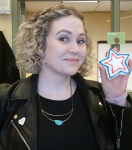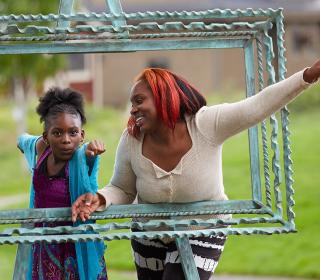This month we're exploring how our healthcare system can perpetuate inequity. Below we've compiled a reading list written entirely by Black women focusing on the intersection of race, gender, and health in a variety of circumstances, including living with a disability, working as a Black doctor, and navigating the mental health system.
- Coronavirus made accessibility a priority. It should stay that way when the pandemic ends. [The Philadelphia Inquirer]
Disabled writer Imani Barbarin describes the pain of seeing companies pivot to remote work due to COVID-19 and not previously for the accessibility needs of potential employees with disabilities.
- America was already failing black mothers. COVID-19 is making it more dangerous than ever. [Cosmo]
Doula and birth educator Latham Thomas talks about how in addition to higher fatality rates, Black women are also statistically more likely to experience pregnancy complications like hypertension, blood disorders, and preeclampsia.
- Two new studies find Black and brown mothers less likely to have their postpartum pain evaluated and addressed [The Glow Up]
As the fight to lower the Black maternal mortality rate continues, new studies provide evidence of stark contrasts in the way mothers of color are treated postpartum, versus white mothers.
- Women of color speak out against the whitewashing of reproductive justice [Elle]
Read the stories from nine Black, Indigenous, and Latinx women who are on the frontlines of intersectional reproductive justice work.
- For doctors and nurses of color, racism in the medical threat that doesn’t go away [Health]
Read how two Black women medical professionals are helping their patients fight COVID-19 while fighting for respect within their workplaces.
- What it’s like to be a fat Black queer femme – with cancer [Nylon]
Read this account of seeking medical treatment for blood cancer, all while being disbelieved by healthcare professionals
- The racist roots of fighting obesity [Scientific American]
Weight loss culture fails to produce thinner or healthier bodies but succeeds in fostering weight stigma. For Black women, this results in added marginalization from sizeism to the sexism and racism that they're already experiencing.
- Meet the activist nourishing and protecting Black trans people right now [Self]
Check out this interview with Ianne Fields Stewart, a queer nonbinary transfeminine actress and founder of the Okra Project, an organization that provides meals cooked by Black trans chefs to Black trans people experiencing food insecurity.
- The reality of navigating the mental health system as a Black woman [Allure]
Read one account of the challenges facing Black women when seeking mental health resources, including both the cultural stigma surrounding mental health services, as well as the issue of underrepresentation in the psychology field.
If the concept of medical racism is new to you, stay tuned for our explainer blog post later this month. In the meantime, read our previous post about how peer-support programs like YWCA's BABES Network can help when navigating the healthcare system as a Black woman.
Issue Area

Annalee Schafranek is the Marketing & Editorial Director at YWCA. She contributes agency news, press releases, and media coverage to the website. Annalee’s educational and professional experience has always focused on the place where gender equity and media meet.
YWCA
We share the stories of our program participants, programs, and staff, as well as news about the agency and what’s happening in our King and Snohomish community.
aschafranek
Featured Image


